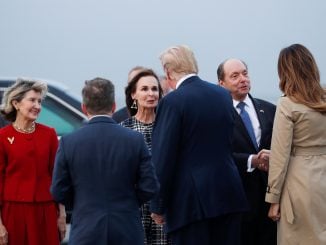ABOARD A U.S. MILITARY AIRCRAFT — The top U.S. commander for the Middle East said he will make recommendations to Defense Secretary Lloyd Austin in early June on how to monitor and fight terrorist groups in Afghanistan from beyond its borders after all American forces withdraw.
Gen. Frank McKenzie, the commander of U.S. Central Command, said negotiations with Afghanistan’s neighbors for overflight rights and troop basing are “moving forward” but will take time. As a result, he said, the way the United States keeps an eye on the terrorist threat and aids the Afghan military will evolve as agreements are reached or security conditions on the ground change.
He cautioned that this will be a “taxing time” for the Afghan military, and “the risk is high.”
Speaking to reporters from The Associated Press and ABC News traveling with him to the Middle East, McKenzie declined to provide details about the recommendations he will make to Austin. He said he will also provide cost estimates for keeping surveillance aircraft over Afghanistan regularly enough to keep track of terrorist groups after the U.S. pullout is completed no later than Sept. 11.
McKenzie has made it clear that without any bases in neighboring countries, it will require far more aircraft to keep watch over Afghanistan because they will have to fly for four hours to six hours from other U.S. military installations in the Middle East. The flight distance severely limits the amount of time the aircraft can spend in the air over Afghanistan.
Military leaders are grappling with how best to carry out President Joe Biden’s order to withdraw all American troops from Afghanistan by September while still providing support to the Afghan forces and monitoring the threat that prompted the U.S. invasion of the country after the attacks of Sept. 11, 2001.
Commanders have said they will monitor threats from “over the horizon” to ensure that terrorists cannot again use Afghanistan as a base to launch attacks against the U.S. But they have acknowledged that the U.S. does not yet have any agreements for basing or overflights from any of the neighboring countries.
McKenzie said he is confident the U.S. will get the access it needs. But as yet, there are no firm solutions or decisions.
At the same time, Pentagon leaders and Congress members have expressed concerns that once the U.S. leaves, the Afghan government and its military will be quickly overrun by the Taliban.
The Afghan military, particularly its air force, has been heavily dependent on the U.S. for maintenance and training, as well as for combat air support when its troops are under attack. McKenzie said he believes the Afghans have a “fighting chance” to be successful and defend themselves.
“It’s time for the Afghan military to stand up and show that they can fight alone,” said McKenzie. “I think it’s going to be a very taxing time for them. I think certainly there is a path for them to preserve what they have now. The risk is high. I don’t want to minimize that.”
U.S. lawmakers have said they believe there is no chance the Taliban will abide by the commitments their leaders made in a February 2020 agreement with the Trump administration, which included engaging in sustained peace negotiations and severing all forms of cooperation with and support for al-Qaida. Members of Congress also worry that al-Qaida and the Islamic State group will take advantage of the chaos and regroup, with a goal of attacking the U.S. again.
McKenzie said that both al-Qaida and IS have been degraded.
“Our concern would be that ungoverned spaces open in Afghanistan and they are able to reassert themselves,” he said. “This would not be immediate. I don’t think anybody (thinks) this is something that will happen next month or even in the next six months. But eventually they will gather their strength again and they’ll be a threat to our homeland.”
Washington’s special envoy to Afghanistan, Zalmay Khalilzad, told a House hearing Tuesday that it is unduly pessimistic to predict that the Kabul government or Afghan military will be quickly overrun by the Taliban once U.S. and coalition forces withdraw.
He said the Taliban have reason not to push for a military victory and instead pursue a negotiated political settlement that could give them international legitimacy and removal from certain American and United Nations sanctions. He recently met with Taliban representatives in Doha, Qatar, as part of a round of consultations with interested parties.



